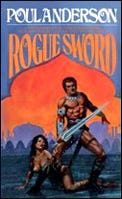Rogue Sword is the story of Emperor Andronicus II of Byzantium: of how in 1303 he cried havoc and let slip the dogs of war, unleashing a pack of unruly Spanish mercenaries upon marauding Turkish invaders, only to have that same pack turn on him three years later, savaging his already wounded Empire and hastening its demise. Unusually for Anderson, a master of fantasy, it's a dark historical swashbuckler, a tale of greed and violence.
Lucas Greco is a bold and restless adventurer. The bastard son of a Venetian nobleman and a Greek woman, he owes allegiance to no one, and takes what he wants from life through guile, quick wits and his sword. He uses people carelessly, especially women. When he does find love, he almost destroys it. His eventual success is a bitter one, bought at the cost of a faithful friend. In 1306, he joins the Grand Catalan Company under the command of Catalan knight Jaime de Caza, a former companion. A band of ruthless Almogàver mercenaries hired to fight off the Turks, the Company is now at war with Byzantium itself following the treacherous murder of its leader, Roger de Flor.
Once-great Byzantium is embattled, no longer able to protect its disintegrating Empire from predatory, power-hungry Turks, Venetians, Genoese, the Frankish Crusader States and, not least, the men of the Grand Catalan Company, intent on carving out their own bloody share of Byzantine territory in vengeful retribution.
Despite its comic-book cover and swaggering air, Rogue Sword is at heart a tragedy in the classical sense: the actions of a flawed central character in a chaotic, brutal world bring disaster for all those around him.
"Behold what came of the wicked deeds of the Emperor and the treachery against us," said Catalan Company commander Ramon Muntaner, "We lorded it all over the land, and we raided the Empire at our ease." (1960, 283 pages)



